Report on Entrepreneurial Ventures and Mindset Exploration
VerifiedAdded on 2023/01/12
|8
|1861
|87
Report
AI Summary
This report provides a comprehensive analysis of entrepreneurial ventures, focusing on different types such as small businesses, large businesses, social enterprises, and scalable startups. It examines the similarities and differences between these ventures and explores their relationship to the typology of entrepreneurship, including lifestyle enterprises, survival firms, and growth firms. The report uses CafePod as a case study, illustrating the impact of micro and small businesses on the economy through relevant data and statistics. It also highlights the importance of small businesses and start-ups in fostering the growth of the social economy, emphasizing their roles in innovation, job creation, and adaptation to market changes. The report concludes by underscoring the significance of entrepreneurship for economic development and societal progress.

Entrepreneurial
Ventures and exploration
of the Entrepreneurial
Mindset
Ventures and exploration
of the Entrepreneurial
Mindset
Paraphrase This Document
Need a fresh take? Get an instant paraphrase of this document with our AI Paraphraser

Contents
INTRODUCTION.....................................................................................................................................3
LO 1............................................................................................................................................................3
P1 Different types of entrepreneurial ventures and explain how they relate to the typology of
entrepreneurship......................................................................................................................................3
P2 Similarities and differences between entrepreneurial ventures...........................................................4
LO 2............................................................................................................................................................5
P3 Interpret and assess relevant data and statistics to illustrate how micro and small businesses impact
on the economy.......................................................................................................................................5
P4 Importance of small businesses and business start-ups to the growth of the social economy.............6
LO 3 and LO 4...........................................................................................................................................7
(Covered in PPT).....................................................................................................................................7
CONCLUSION..........................................................................................................................................7
REFERENCES..........................................................................................................................................8
INTRODUCTION.....................................................................................................................................3
LO 1............................................................................................................................................................3
P1 Different types of entrepreneurial ventures and explain how they relate to the typology of
entrepreneurship......................................................................................................................................3
P2 Similarities and differences between entrepreneurial ventures...........................................................4
LO 2............................................................................................................................................................5
P3 Interpret and assess relevant data and statistics to illustrate how micro and small businesses impact
on the economy.......................................................................................................................................5
P4 Importance of small businesses and business start-ups to the growth of the social economy.............6
LO 3 and LO 4...........................................................................................................................................7
(Covered in PPT).....................................................................................................................................7
CONCLUSION..........................................................................................................................................7
REFERENCES..........................................................................................................................................8
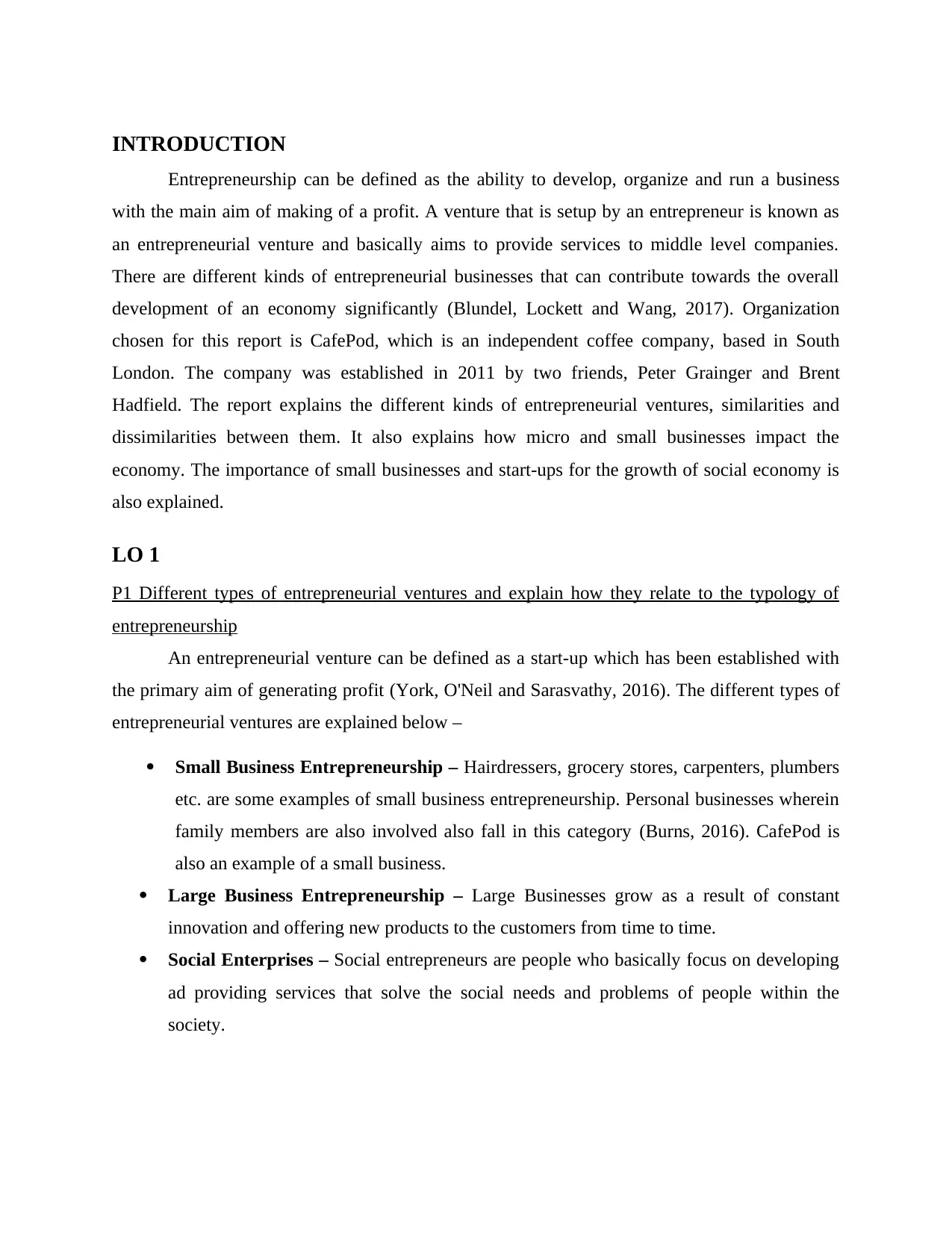
INTRODUCTION
Entrepreneurship can be defined as the ability to develop, organize and run a business
with the main aim of making of a profit. A venture that is setup by an entrepreneur is known as
an entrepreneurial venture and basically aims to provide services to middle level companies.
There are different kinds of entrepreneurial businesses that can contribute towards the overall
development of an economy significantly (Blundel, Lockett and Wang, 2017). Organization
chosen for this report is CafePod, which is an independent coffee company, based in South
London. The company was established in 2011 by two friends, Peter Grainger and Brent
Hadfield. The report explains the different kinds of entrepreneurial ventures, similarities and
dissimilarities between them. It also explains how micro and small businesses impact the
economy. The importance of small businesses and start-ups for the growth of social economy is
also explained.
LO 1
P1 Different types of entrepreneurial ventures and explain how they relate to the typology of
entrepreneurship
An entrepreneurial venture can be defined as a start-up which has been established with
the primary aim of generating profit (York, O'Neil and Sarasvathy, 2016). The different types of
entrepreneurial ventures are explained below –
Small Business Entrepreneurship – Hairdressers, grocery stores, carpenters, plumbers
etc. are some examples of small business entrepreneurship. Personal businesses wherein
family members are also involved also fall in this category (Burns, 2016). CafePod is
also an example of a small business.
Large Business Entrepreneurship – Large Businesses grow as a result of constant
innovation and offering new products to the customers from time to time.
Social Enterprises – Social entrepreneurs are people who basically focus on developing
ad providing services that solve the social needs and problems of people within the
society.
Entrepreneurship can be defined as the ability to develop, organize and run a business
with the main aim of making of a profit. A venture that is setup by an entrepreneur is known as
an entrepreneurial venture and basically aims to provide services to middle level companies.
There are different kinds of entrepreneurial businesses that can contribute towards the overall
development of an economy significantly (Blundel, Lockett and Wang, 2017). Organization
chosen for this report is CafePod, which is an independent coffee company, based in South
London. The company was established in 2011 by two friends, Peter Grainger and Brent
Hadfield. The report explains the different kinds of entrepreneurial ventures, similarities and
dissimilarities between them. It also explains how micro and small businesses impact the
economy. The importance of small businesses and start-ups for the growth of social economy is
also explained.
LO 1
P1 Different types of entrepreneurial ventures and explain how they relate to the typology of
entrepreneurship
An entrepreneurial venture can be defined as a start-up which has been established with
the primary aim of generating profit (York, O'Neil and Sarasvathy, 2016). The different types of
entrepreneurial ventures are explained below –
Small Business Entrepreneurship – Hairdressers, grocery stores, carpenters, plumbers
etc. are some examples of small business entrepreneurship. Personal businesses wherein
family members are also involved also fall in this category (Burns, 2016). CafePod is
also an example of a small business.
Large Business Entrepreneurship – Large Businesses grow as a result of constant
innovation and offering new products to the customers from time to time.
Social Enterprises – Social entrepreneurs are people who basically focus on developing
ad providing services that solve the social needs and problems of people within the
society.
⊘ This is a preview!⊘
Do you want full access?
Subscribe today to unlock all pages.

Trusted by 1+ million students worldwide
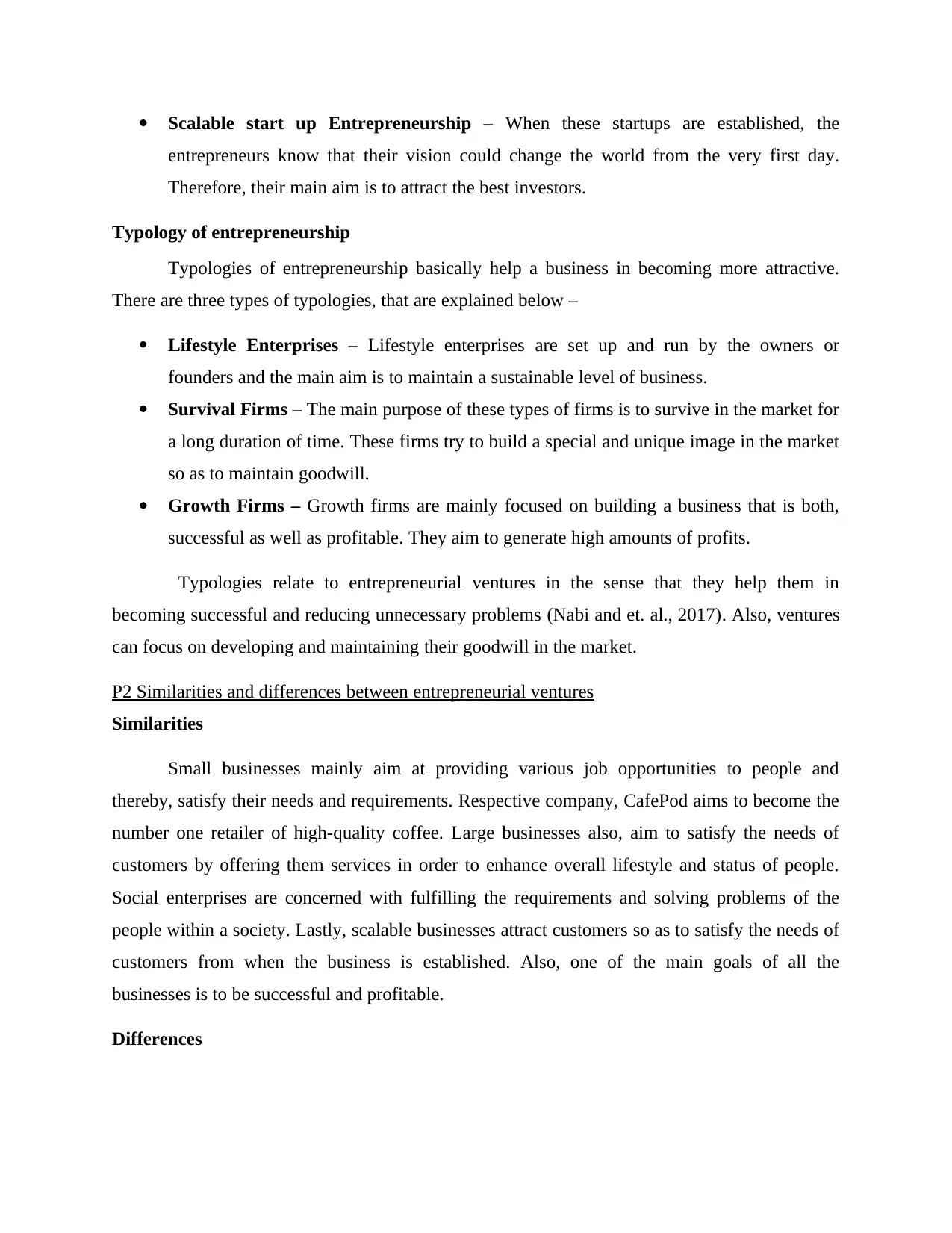
Scalable start up Entrepreneurship – When these startups are established, the
entrepreneurs know that their vision could change the world from the very first day.
Therefore, their main aim is to attract the best investors.
Typology of entrepreneurship
Typologies of entrepreneurship basically help a business in becoming more attractive.
There are three types of typologies, that are explained below –
Lifestyle Enterprises – Lifestyle enterprises are set up and run by the owners or
founders and the main aim is to maintain a sustainable level of business.
Survival Firms – The main purpose of these types of firms is to survive in the market for
a long duration of time. These firms try to build a special and unique image in the market
so as to maintain goodwill.
Growth Firms – Growth firms are mainly focused on building a business that is both,
successful as well as profitable. They aim to generate high amounts of profits.
Typologies relate to entrepreneurial ventures in the sense that they help them in
becoming successful and reducing unnecessary problems (Nabi and et. al., 2017). Also, ventures
can focus on developing and maintaining their goodwill in the market.
P2 Similarities and differences between entrepreneurial ventures
Similarities
Small businesses mainly aim at providing various job opportunities to people and
thereby, satisfy their needs and requirements. Respective company, CafePod aims to become the
number one retailer of high-quality coffee. Large businesses also, aim to satisfy the needs of
customers by offering them services in order to enhance overall lifestyle and status of people.
Social enterprises are concerned with fulfilling the requirements and solving problems of the
people within a society. Lastly, scalable businesses attract customers so as to satisfy the needs of
customers from when the business is established. Also, one of the main goals of all the
businesses is to be successful and profitable.
Differences
entrepreneurs know that their vision could change the world from the very first day.
Therefore, their main aim is to attract the best investors.
Typology of entrepreneurship
Typologies of entrepreneurship basically help a business in becoming more attractive.
There are three types of typologies, that are explained below –
Lifestyle Enterprises – Lifestyle enterprises are set up and run by the owners or
founders and the main aim is to maintain a sustainable level of business.
Survival Firms – The main purpose of these types of firms is to survive in the market for
a long duration of time. These firms try to build a special and unique image in the market
so as to maintain goodwill.
Growth Firms – Growth firms are mainly focused on building a business that is both,
successful as well as profitable. They aim to generate high amounts of profits.
Typologies relate to entrepreneurial ventures in the sense that they help them in
becoming successful and reducing unnecessary problems (Nabi and et. al., 2017). Also, ventures
can focus on developing and maintaining their goodwill in the market.
P2 Similarities and differences between entrepreneurial ventures
Similarities
Small businesses mainly aim at providing various job opportunities to people and
thereby, satisfy their needs and requirements. Respective company, CafePod aims to become the
number one retailer of high-quality coffee. Large businesses also, aim to satisfy the needs of
customers by offering them services in order to enhance overall lifestyle and status of people.
Social enterprises are concerned with fulfilling the requirements and solving problems of the
people within a society. Lastly, scalable businesses attract customers so as to satisfy the needs of
customers from when the business is established. Also, one of the main goals of all the
businesses is to be successful and profitable.
Differences
Paraphrase This Document
Need a fresh take? Get an instant paraphrase of this document with our AI Paraphraser
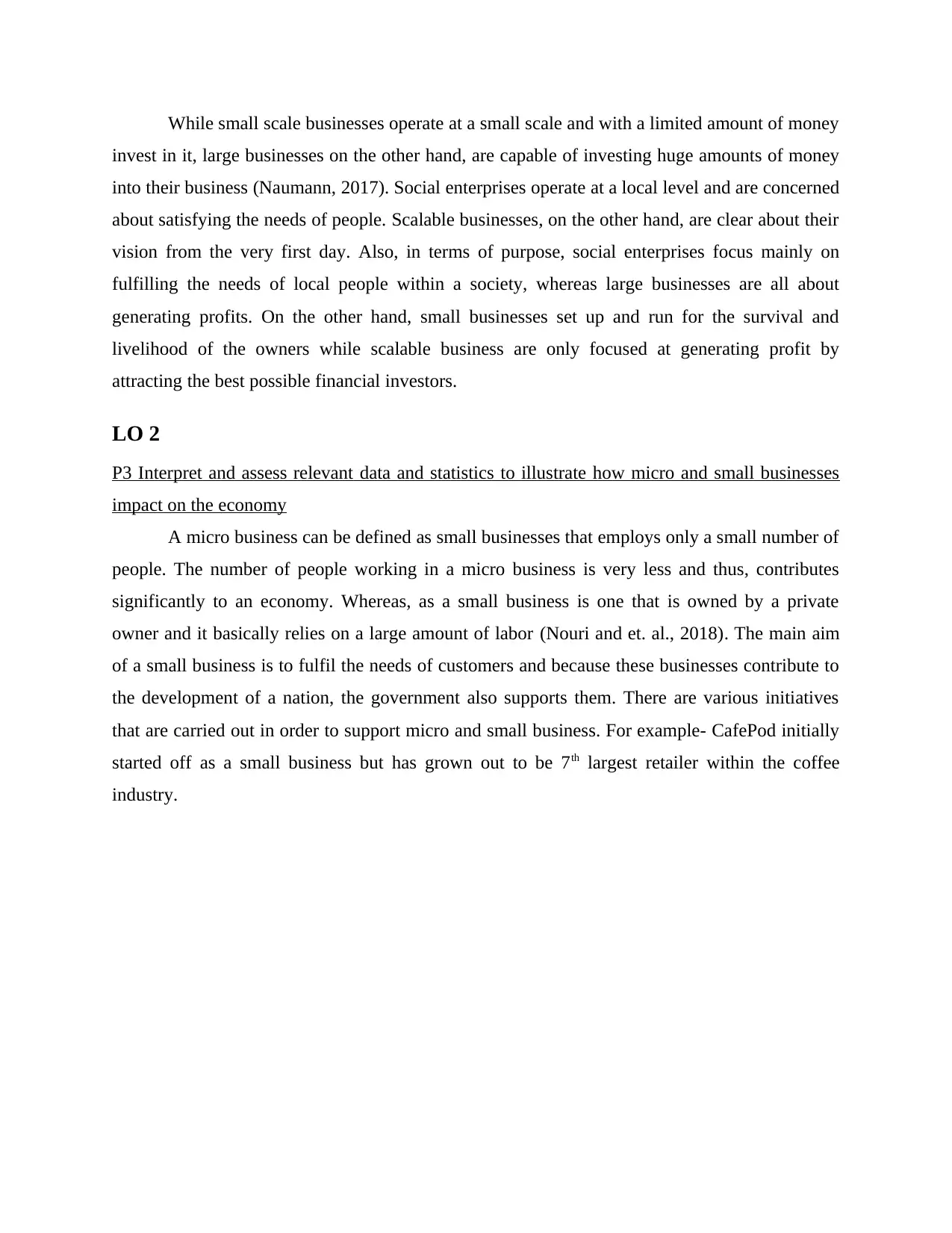
While small scale businesses operate at a small scale and with a limited amount of money
invest in it, large businesses on the other hand, are capable of investing huge amounts of money
into their business (Naumann, 2017). Social enterprises operate at a local level and are concerned
about satisfying the needs of people. Scalable businesses, on the other hand, are clear about their
vision from the very first day. Also, in terms of purpose, social enterprises focus mainly on
fulfilling the needs of local people within a society, whereas large businesses are all about
generating profits. On the other hand, small businesses set up and run for the survival and
livelihood of the owners while scalable business are only focused at generating profit by
attracting the best possible financial investors.
LO 2
P3 Interpret and assess relevant data and statistics to illustrate how micro and small businesses
impact on the economy
A micro business can be defined as small businesses that employs only a small number of
people. The number of people working in a micro business is very less and thus, contributes
significantly to an economy. Whereas, as a small business is one that is owned by a private
owner and it basically relies on a large amount of labor (Nouri and et. al., 2018). The main aim
of a small business is to fulfil the needs of customers and because these businesses contribute to
the development of a nation, the government also supports them. There are various initiatives
that are carried out in order to support micro and small business. For example- CafePod initially
started off as a small business but has grown out to be 7th largest retailer within the coffee
industry.
invest in it, large businesses on the other hand, are capable of investing huge amounts of money
into their business (Naumann, 2017). Social enterprises operate at a local level and are concerned
about satisfying the needs of people. Scalable businesses, on the other hand, are clear about their
vision from the very first day. Also, in terms of purpose, social enterprises focus mainly on
fulfilling the needs of local people within a society, whereas large businesses are all about
generating profits. On the other hand, small businesses set up and run for the survival and
livelihood of the owners while scalable business are only focused at generating profit by
attracting the best possible financial investors.
LO 2
P3 Interpret and assess relevant data and statistics to illustrate how micro and small businesses
impact on the economy
A micro business can be defined as small businesses that employs only a small number of
people. The number of people working in a micro business is very less and thus, contributes
significantly to an economy. Whereas, as a small business is one that is owned by a private
owner and it basically relies on a large amount of labor (Nouri and et. al., 2018). The main aim
of a small business is to fulfil the needs of customers and because these businesses contribute to
the development of a nation, the government also supports them. There are various initiatives
that are carried out in order to support micro and small business. For example- CafePod initially
started off as a small business but has grown out to be 7th largest retailer within the coffee
industry.
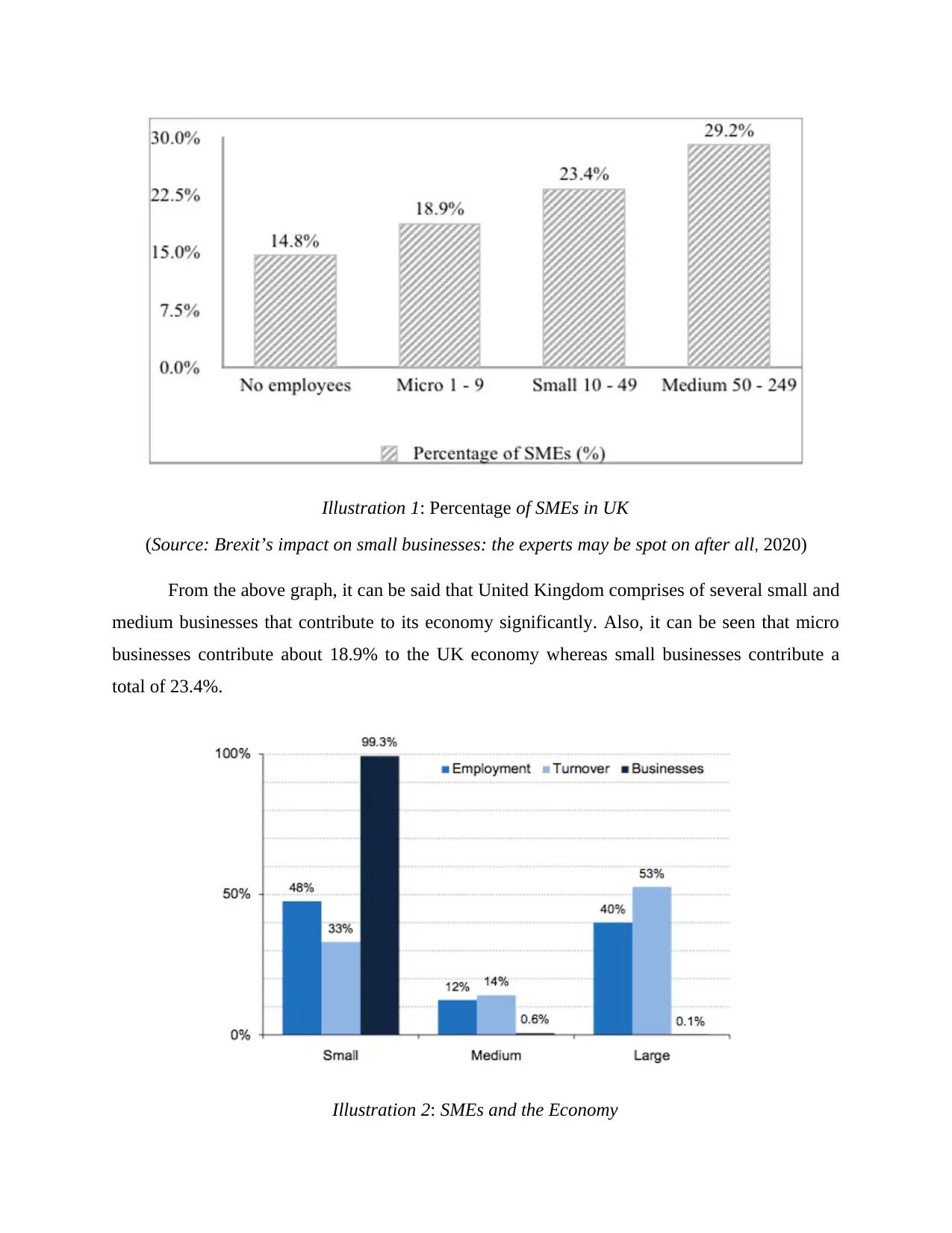
Illustration 1: Percentage of SMEs in UK
(Source: Brexit’s impact on small businesses: the experts may be spot on after all, 2020)
From the above graph, it can be said that United Kingdom comprises of several small and
medium businesses that contribute to its economy significantly. Also, it can be seen that micro
businesses contribute about 18.9% to the UK economy whereas small businesses contribute a
total of 23.4%.
Illustration 2: SMEs and the Economy
(Source: Brexit’s impact on small businesses: the experts may be spot on after all, 2020)
From the above graph, it can be said that United Kingdom comprises of several small and
medium businesses that contribute to its economy significantly. Also, it can be seen that micro
businesses contribute about 18.9% to the UK economy whereas small businesses contribute a
total of 23.4%.
Illustration 2: SMEs and the Economy
⊘ This is a preview!⊘
Do you want full access?
Subscribe today to unlock all pages.

Trusted by 1+ million students worldwide
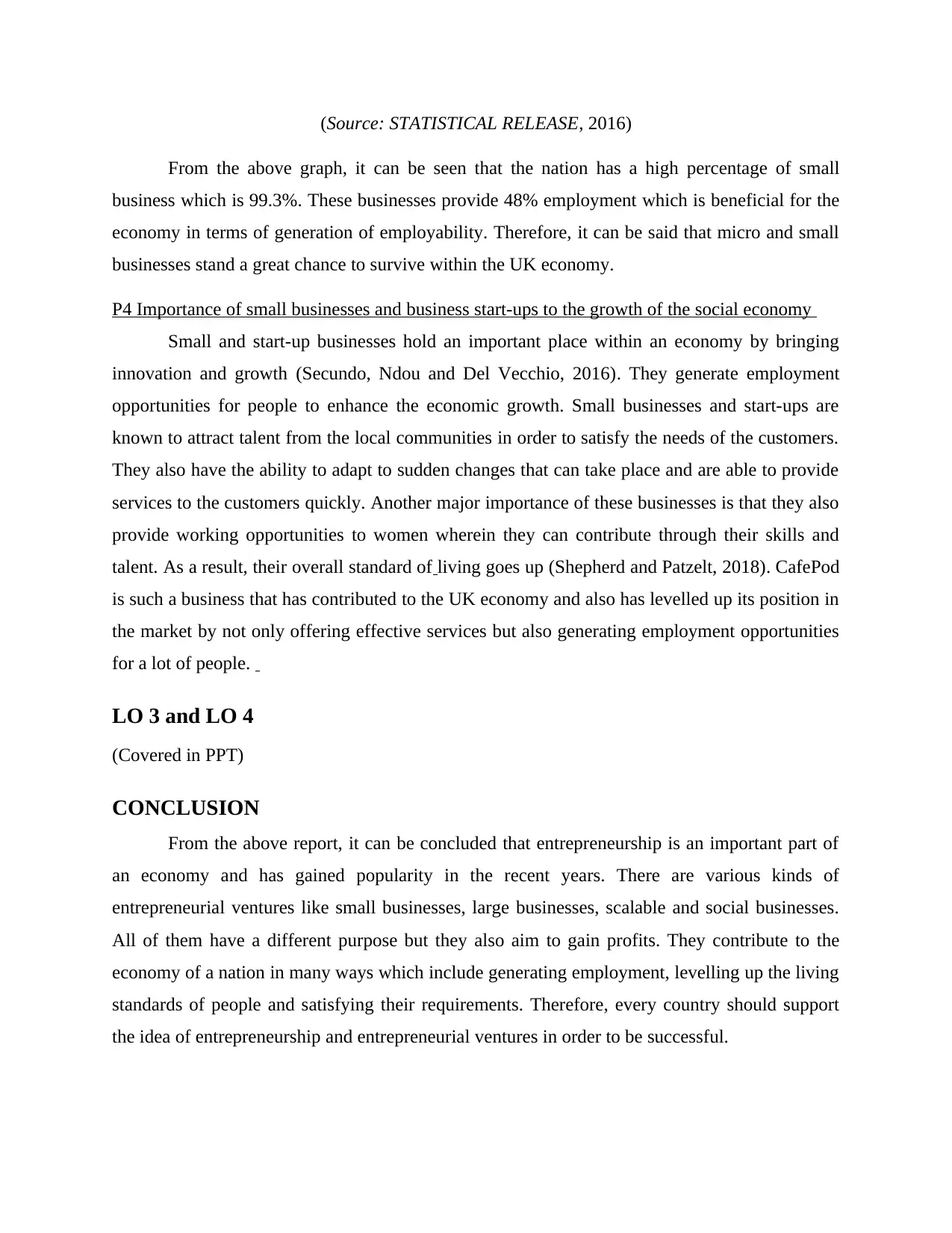
(Source: STATISTICAL RELEASE, 2016)
From the above graph, it can be seen that the nation has a high percentage of small
business which is 99.3%. These businesses provide 48% employment which is beneficial for the
economy in terms of generation of employability. Therefore, it can be said that micro and small
businesses stand a great chance to survive within the UK economy.
P4 Importance of small businesses and business start-ups to the growth of the social economy
Small and start-up businesses hold an important place within an economy by bringing
innovation and growth (Secundo, Ndou and Del Vecchio, 2016). They generate employment
opportunities for people to enhance the economic growth. Small businesses and start-ups are
known to attract talent from the local communities in order to satisfy the needs of the customers.
They also have the ability to adapt to sudden changes that can take place and are able to provide
services to the customers quickly. Another major importance of these businesses is that they also
provide working opportunities to women wherein they can contribute through their skills and
talent. As a result, their overall standard of living goes up (Shepherd and Patzelt, 2018). CafePod
is such a business that has contributed to the UK economy and also has levelled up its position in
the market by not only offering effective services but also generating employment opportunities
for a lot of people.
LO 3 and LO 4
(Covered in PPT)
CONCLUSION
From the above report, it can be concluded that entrepreneurship is an important part of
an economy and has gained popularity in the recent years. There are various kinds of
entrepreneurial ventures like small businesses, large businesses, scalable and social businesses.
All of them have a different purpose but they also aim to gain profits. They contribute to the
economy of a nation in many ways which include generating employment, levelling up the living
standards of people and satisfying their requirements. Therefore, every country should support
the idea of entrepreneurship and entrepreneurial ventures in order to be successful.
From the above graph, it can be seen that the nation has a high percentage of small
business which is 99.3%. These businesses provide 48% employment which is beneficial for the
economy in terms of generation of employability. Therefore, it can be said that micro and small
businesses stand a great chance to survive within the UK economy.
P4 Importance of small businesses and business start-ups to the growth of the social economy
Small and start-up businesses hold an important place within an economy by bringing
innovation and growth (Secundo, Ndou and Del Vecchio, 2016). They generate employment
opportunities for people to enhance the economic growth. Small businesses and start-ups are
known to attract talent from the local communities in order to satisfy the needs of the customers.
They also have the ability to adapt to sudden changes that can take place and are able to provide
services to the customers quickly. Another major importance of these businesses is that they also
provide working opportunities to women wherein they can contribute through their skills and
talent. As a result, their overall standard of living goes up (Shepherd and Patzelt, 2018). CafePod
is such a business that has contributed to the UK economy and also has levelled up its position in
the market by not only offering effective services but also generating employment opportunities
for a lot of people.
LO 3 and LO 4
(Covered in PPT)
CONCLUSION
From the above report, it can be concluded that entrepreneurship is an important part of
an economy and has gained popularity in the recent years. There are various kinds of
entrepreneurial ventures like small businesses, large businesses, scalable and social businesses.
All of them have a different purpose but they also aim to gain profits. They contribute to the
economy of a nation in many ways which include generating employment, levelling up the living
standards of people and satisfying their requirements. Therefore, every country should support
the idea of entrepreneurship and entrepreneurial ventures in order to be successful.
Paraphrase This Document
Need a fresh take? Get an instant paraphrase of this document with our AI Paraphraser

REFERENCES
Books & Journals
Blundel, R., Lockett, N. and Wang, C., 2017. Exploring entrepreneurship. Sage.
Burns, P., 2016. Entrepreneurship and small business. Palgrave Macmillan Limited.
Nabi, G. and et. al., 2017. The impact of entrepreneurship education in higher education: A
systematic review and research agenda. Academy of Management Learning & Education.
16(2). pp.277-299.
Naumann, C., 2017. Entrepreneurial mindset: A synthetic literature review. Entrepreneurial
Business and Economics Review. 5(3). pp.149-172.
Nouri, P. and et. al., 2018. Exploring Positive Outcomes of Decision Making Biases in the Field
of Entrepreneurial Marketing. Qualitative Report, 23(6).
Secundo, G., Ndou, V. and Del Vecchio, P., 2016. Challenges for instilling entrepreneurial
mindset in scientists and engineers: what works in European universities?. International
Journal of Innovation and Technology Management. 13(05). p.1640012.
Shepherd, D. A. and Patzelt, H., 2018. Entrepreneurial cognition: Exploring the mindset of
entrepreneurs. Cham: Palgrave Macmillan.
York, J. G., O'Neil, I. and Sarasvathy, S. D., 2016. Exploring environmental entrepreneurship:
Identity coupling, venture goals, and stakeholder incentives. Journal of Management
Studies. 53(5). pp.695-737.
Online
Brexit’s impact on small businesses: the experts may be spot on after all. 2020. [ Online].
Available through:< https://theconversation.com/brexits-impact-on-small-businesses-the-
experts-may-be-spot-on-after-all-90561>.
SMEs and the Economy. 2016. [Online]. Available through:<
https://assets.publishing.service.gov.uk/government/uploads/system/uploads/
attachment_data/file/559219/bpe_2016_statistical_release.pdf >.
Books & Journals
Blundel, R., Lockett, N. and Wang, C., 2017. Exploring entrepreneurship. Sage.
Burns, P., 2016. Entrepreneurship and small business. Palgrave Macmillan Limited.
Nabi, G. and et. al., 2017. The impact of entrepreneurship education in higher education: A
systematic review and research agenda. Academy of Management Learning & Education.
16(2). pp.277-299.
Naumann, C., 2017. Entrepreneurial mindset: A synthetic literature review. Entrepreneurial
Business and Economics Review. 5(3). pp.149-172.
Nouri, P. and et. al., 2018. Exploring Positive Outcomes of Decision Making Biases in the Field
of Entrepreneurial Marketing. Qualitative Report, 23(6).
Secundo, G., Ndou, V. and Del Vecchio, P., 2016. Challenges for instilling entrepreneurial
mindset in scientists and engineers: what works in European universities?. International
Journal of Innovation and Technology Management. 13(05). p.1640012.
Shepherd, D. A. and Patzelt, H., 2018. Entrepreneurial cognition: Exploring the mindset of
entrepreneurs. Cham: Palgrave Macmillan.
York, J. G., O'Neil, I. and Sarasvathy, S. D., 2016. Exploring environmental entrepreneurship:
Identity coupling, venture goals, and stakeholder incentives. Journal of Management
Studies. 53(5). pp.695-737.
Online
Brexit’s impact on small businesses: the experts may be spot on after all. 2020. [ Online].
Available through:< https://theconversation.com/brexits-impact-on-small-businesses-the-
experts-may-be-spot-on-after-all-90561>.
SMEs and the Economy. 2016. [Online]. Available through:<
https://assets.publishing.service.gov.uk/government/uploads/system/uploads/
attachment_data/file/559219/bpe_2016_statistical_release.pdf >.
1 out of 8
Related Documents
Your All-in-One AI-Powered Toolkit for Academic Success.
+13062052269
info@desklib.com
Available 24*7 on WhatsApp / Email
![[object Object]](/_next/static/media/star-bottom.7253800d.svg)
Unlock your academic potential
Copyright © 2020–2026 A2Z Services. All Rights Reserved. Developed and managed by ZUCOL.



